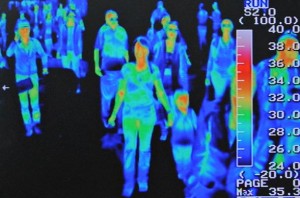 The University of Greece has recently published a report on thermal imaging of intoxication technology this year in the International Journal of Electronic Security and Digital Forensics. It describes the new testing method, which uses various algorithms to scan images from thermal cameras for signs and symptoms of intoxication. This is simply astounding (and scary). It also raises the question: How is this done?
The University of Greece has recently published a report on thermal imaging of intoxication technology this year in the International Journal of Electronic Security and Digital Forensics. It describes the new testing method, which uses various algorithms to scan images from thermal cameras for signs and symptoms of intoxication. This is simply astounding (and scary). It also raises the question: How is this done?
When we drink alcohol, it brings the blood in our bodies to the surface of our skin in certain predictable patterns, rosy cheeks for example. As the theory goes, this heat can be seen or detected on our skin as we drink more. The example given by the Greek scientists who pioneered this study, Georgia Koukiou and Vassilis Anastassopoulos, is that our noses get warmer as we drink, but our foreheads do not. Thermal imaging is meant to detect these heat patterns. The authors recommended that this technology be adapted for use by police departments to detect alcohol consumption, namely in DUI enforcement.
However, there are legal concerns in adopting this technology for use in DUI detection. This is not the first time that infrared technology has been used to detect criminal action, and how it can relate to constitutional versus unconstitutional searches. Take the 2001 case of Kyllo v. United States. In this case, an officer suspected that Danny Kyllo was growing marijuana inside his home by using heat lamps. With an infrared camera positioned across the street from Kyllo’s home, the officer used the heat evidence obtained to gain a search warrant for the house. The U.S. Supreme Court ruled that this infrared scan constituted a search under the Fourth Amendment, and because it was done without a warrant, it was unconstitutional.
Although the expectation of privacy differs between car and home, officers must still have probable cause to conduct a traffic stop. A search of your body and vehicle done without probable cause does not meet the requirements of the law. Essentially, what this thermal imaging technology is allowing police to do is to look into your car as well as your body, without your consent and without prior cause or reasonable suspicion. Ultimately, officers will use this novel tool to judge whether your body temperature may or may not indicate impairment. This is not constitutional, and is a questionable practice that if implemented, would surely lead to many unlawful searches that violate the 4th Amendment.
Lastly, how accurate can this technology really be? The theory doesn’t seem to account for any changes from person-to-person, and body temperature changes are subject to many different variables. Every body is different. We all react differently to alcohol and other factors that can affect body temperature; heat, fever, stress, anxiety, changes in weather, emotions, medicines, spicy foods, afflictions, the list goes on. Using thermal imaging to detect intoxication is interesting, but the science behind it is questionable at best. Too many variables exist to permit its use here in Arizona or the rest of the United States. If it starts to be used here, the Fourth Amendment rights of nearly every “scanned” DUI suspect will have been violated. It is legally irresponsible for the government to throw civil rights to the wayside in favor of obtaining more arrests, but unfortunately, this is exactly what would happen if this suspicious technology were to be used in Arizona.




